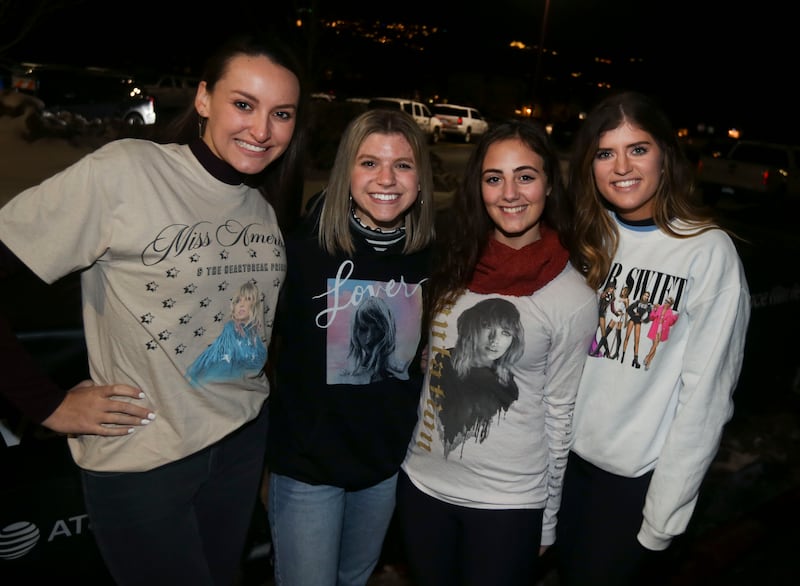PARK CITY — Taylor Swift didn’t have a lot to say after the world premiere of “Miss Americana” at the Sundance Film Festival. That’s because the raw documentary did most of the talking for her.
“Miss Americana” covers a lot — and a lot of it isn’t pretty. It shows Swift’s 2017 album “Reputation” getting snubbed for major Grammy Awards, it digs into the negative effects of global stardom that led Swift to struggle with an eating disorder and, yes, it includes the notorious moment in 2009 when Kanye West hijacked Swift’s MTV Video Music Award victory with his “I’mma let you finish” tirade.
But “Miss Americana” also shows Swift to be happier than she’s ever been.
And when the 30-year-old pop singer stepped onto the stage in Park City, Utah, Thursday night — an appearance the Sundance Film Festival kept under wraps since announcing the 2020 lineup in early December — Swift had only words of gratitude for her audience of 1,300 and Emmy Award-winning director Lana Wilson.

“For so much of my life, in the public eye, when I get sad or upset or humiliated or angry or go through a really horrible time, I feel people lean in with this hunger. And you never did that to me,” she told Wilson, who spent countless hours interviewing and capturing intimate footage of her. “I felt like when I got sad, you did, too, and so it made all of that all right. It didn’t make me feel like, ‘Oh, she feels like she’s got a good part for her movie now.’ And I really want to thank you for that.”
Wilson began filming Swift during a transformational chapter in the singer’s life — a time when Swift was questioning a lifestyle that for so long had been dependent on other people’s approval. In that unstable system, “one bad thing can cause everything to crumble,” Swift says in “Miss Americana,” adding that when people began booing after West interrupted her big moment at the VMA ceremony, she thought everyone was booing her.
And in 2016, when that drama reemerged with West’s song “Famous” — in addition to social media drama with her ex-boyfriend Calvin Harris — #TaylorSwiftIsOverParty began trending worldwide on Twitter.
“Do you know how many people have to be tweeting they hate you to make it a trending topic?” Swift says in “Miss Americana.”

So Swift disappeared for a year. That’s what she thought people wanted. During this tumultuous time, the documentary shows Swift working on her sixth album, “Reputation,” and beginning to date Joe Alwyn — a relationship she has kept private for more than three years (Alwyn’s fleeting presence in “Miss Americana” shows Swift still plans to keep that relationship out of the public eye).
But something else also happens during this year off the grid: Swift begins letting go of her longtime need for approval. The ceaseless public scrutiny has made her realize she can’t please everyone, and she starts embracing her own voice and finding “happiness without anyone else’s input.”
“It was really amazing to get to witness,” Wilson said after the documentary’s world premiere. “I think girls especially growing up in this culture are taught that other people’s approval is of paramount importance to their self-worth. Seeing you experience that … but then coming to this completely new understanding of your relationship to other people’s approval was really inspiring and empowering.”
But that doesn’t mean Swift is completely immune to outside influences.
An early scene in “Miss Americana” zooms in on the singer, who is hearing the news from her publicist that “Reputation” has not been nominated for the top Grammy Awards.
“This is fine,” Swift says.
But her face tells another story before she goes on to declare that she “just needs to make a better record.”

“Miss Americana” then cuts to the studio where Swift is working on the album “Lover” (up for a Grammy Award on Sunday). The documentary dives deep into one of Swift’s greatest strengths — the ability to channel her emotional range of experiences into music. It’s a complex process that often starts simply, with Swift sitting at the piano recording the music and lyrics on her phone.
Before “Miss Americana,” Swift had never been filmed in the studio. It’s fascinating to watch her creative process — not to mention her attempt to explain her elaborate ideas for the music video “ME!” to Brendon Urie. Through clips of old home videos, “Miss Americana” shows that songwriting has always been in Swift’s blood — from her debut album as a country singer at 16 to the 30-year-old pop phenomenon she is today.
But one thing that has changed over time is Swift’s resolve to speak up for her beliefs — a move that was inspired, in part, by Swift testifying in 2017 against a former radio DJ who allegedly groped her at a backstage meet-and-greet in 2013.
“I had all the privilege in the world and financial support and the ability to pay for a brilliant lawyer. I won that trial, but without all that? I don’t know what would’ve happened,” Swift said after the premiere. “Our political opinions are defined by what happens to us in our lives, so that was one of the things that happened to me.”
From there, Swift goes on to make her first political endorsement via Instagram. It’s a moment that leads to a heated discussion between Swift and those closest to her — including her father, Scott Swift, who is hesitant to see his daughter enter the political realm.
“My dad has always just been so terrified about my safety since I was a kid,” Swift told the audience at Sundance. “There are so many threats we get on a daily basis that nobody ever knows about and we try to keep that stuff under wraps as much as possible, but my dad is the one who has to see it.”
“Miss Americana” also shows Swift’s mom, Andrea Swift, to be a constant companion to her daughter — from waiting for her backstage during a concert to crying for her during the 2017 trial to sitting next to her on the couch when she posts her first political endorsement on social media.
The documentary doesn’t go too much into Andrea Swift’s cancer diagnosis — since the documentary, Swift’s mom has also been diagnosed with a brain tumor — other than to show how it has helped Swift prioritize the things that matter most.
“Do you really care if the internet doesn’t like you today if your mom’s sick from her chemo?” Swift says.

That moment, like so many others, speaks to how the documentary has given us a better view of Swift’s personal life. When Wilson first met Swift and began filming the documentary, the singer hadn’t done press for about three years. “Miss Americana” shows an intimate side to Swift fans worldwide have been longing to see.
“In the whole ‘Reputation’ era, she didn’t do interviews,” said Amber Thomas, a longtime fan who took a selfie with Swift at the premiere. “So the only things we really saw from her were on tour or over social media. As fans, we feel like we grew up with her and we’re waiting to hear from an old friend — to catch up with an old friend who we haven’t heard from in a while.”
“Miss Americana” hits Netflix Jan. 31.


